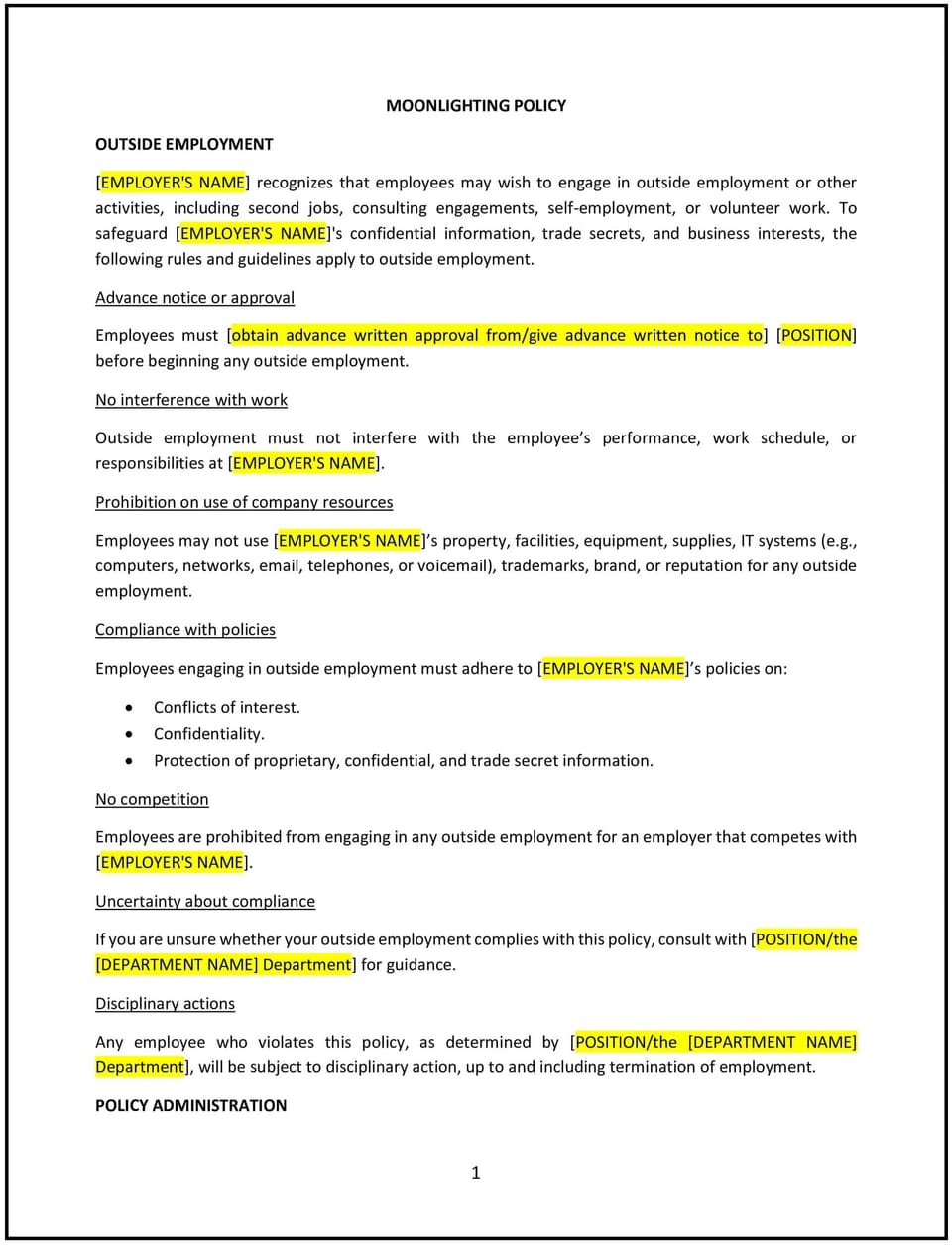Moonlighting policy (Maine): Free template

Moonlighting policy (Maine): Free template
This moonlighting policy is designed to help Maine businesses manage employees who engage in secondary employment, or "moonlighting," outside their primary job. It outlines guidelines to ensure that secondary employment does not interfere with job performance, create conflicts of interest, or violate company standards.
By implementing this policy, Maine businesses can maintain productivity, protect intellectual property, and ensure that employees’ outside work does not negatively impact their role within the organization.
How to use this moonlighting policy (Maine)
- Define moonlighting: Clearly explain what constitutes moonlighting, such as taking on a second job or freelance work outside the primary employment.
- Set guidelines for secondary employment: Establish acceptable conditions for moonlighting, including hours, types of work, and any potential conflicts of interest.
- Address conflicts of interest: Prohibit employees from engaging in work that competes with the business, directly or indirectly, or could create a conflict of interest.
- Establish performance expectations: Clarify that employees must meet performance standards in their primary role, and that moonlighting should not interfere with their job duties.
- Require disclosure: Require employees to inform management or HR if they engage in moonlighting, particularly if it could affect their performance or create conflicts.
- Include non-compete clauses: If applicable, specify any non-compete restrictions that apply to employees engaging in outside work, especially in similar industries or positions.
- Review regularly: Update the policy to reflect changes in business needs, legal requirements, or workplace standards.
Benefits of using this moonlighting policy (Maine)
Implementing this policy provides several benefits for Maine businesses:
- Protects productivity: Ensures that employees’ secondary employment does not interfere with their performance or work hours.
- Mitigates conflicts of interest: Prevents employees from engaging in outside work that competes with the business or creates ethical dilemmas.
- Clarifies expectations: Provides employees with clear guidelines on what is acceptable regarding moonlighting and secondary employment.
- Reduces legal risks: Protects intellectual property and confidential information by addressing potential conflicts in secondary jobs.
- Maintains fairness: Ensures that all employees are treated equally when engaging in outside work, avoiding favoritism or preferential treatment.
Tips for using this moonlighting policy (Maine)
- Communicate the policy: Make sure employees are aware of the moonlighting policy from the beginning, during onboarding, and as part of the employee handbook.
- Be transparent: Encourage employees to disclose any secondary employment opportunities to management so that potential conflicts can be addressed early.
- Monitor performance: Regularly assess employee performance to ensure that moonlighting is not negatively impacting work responsibilities.
- Be consistent: Apply the policy consistently across all employees, regardless of position or department, to avoid perceptions of favoritism.
- Stay compliant: Regularly review the policy to ensure it complies with Maine state laws and industry-specific regulations.
- Encourage open dialogue: Allow employees to discuss their secondary employment plans and be open to adjustments to avoid conflicts.
Q: What is considered moonlighting under this policy?
A: Moonlighting refers to any secondary employment, freelance work, or business activity that an employee engages in outside of their primary role with the company.
Q: Are employees required to disclose their secondary employment?
A: Yes, employees should inform their manager or HR if they are engaging in any secondary employment that could potentially interfere with their work or create a conflict of interest.
Q: How can businesses ensure moonlighting does not affect productivity?
A: Businesses can set performance expectations and monitor employee performance to ensure that secondary employment does not interfere with their duties or job quality.
Q: Can employees moonlight in the same industry as their primary job?
A: Employees may not engage in secondary employment that competes with the business or creates a conflict of interest. This should be clearly addressed in the policy.
Q: What should employees do if their moonlighting could create a conflict of interest?
A: Employees should disclose the potential conflict to their manager or HR for discussion and resolution.
Q: Can businesses prevent employees from moonlighting altogether?
A: While businesses can set restrictions, a blanket ban on moonlighting may not be feasible in all cases. It is important to focus on ensuring that secondary employment does not interfere with performance or create conflicts of interest.
Q: How often should businesses review the moonlighting policy?
A: Businesses should review the policy annually or when there are changes to business needs, legal requirements, or workplace conditions.
This article contains general legal information and does not contain legal advice. Cobrief is not a law firm or a substitute for an attorney or law firm. The law is complex and changes often. For legal advice, please ask a lawyer.


